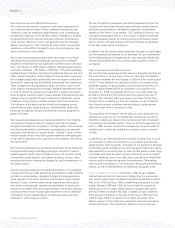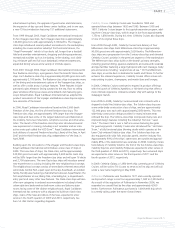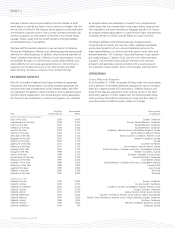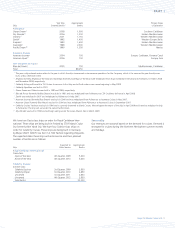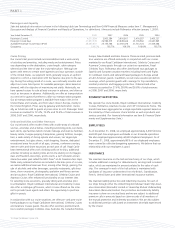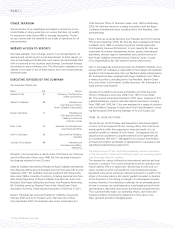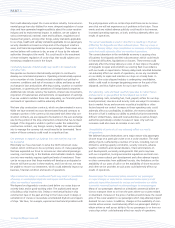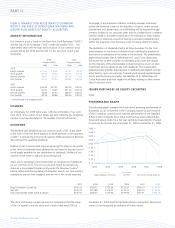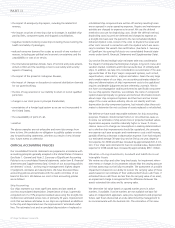Royal Caribbean Cruise Lines 2008 Annual Report Download - page 28
Download and view the complete annual report
Please find page 28 of the 2008 Royal Caribbean Cruise Lines annual report below. You can navigate through the pages in the report by either clicking on the pages listed below, or by using the keyword search tool below to find specific information within the annual report.
12 Royal Caribbean Cruises Ltd.
PART I
From time to time, environmental and other regulators consider more
stringent regulations, which may affect our operations and increase
our compliance costs. We believe that the impact of cruise ships on the
global environment will continue to be an area of focus by the relevant
authorities throughout the world and, accordingly, this will likely sub-
ject us to increasing compliance costs in the future.
Our ships are subject to the International Maritime Organization’s
regulations under the International Convention for the Prevention of
Pollution from Ships (the “MARPOL Regulations”), which impose limita-
tions on the sulfur content of fuel used by ships operating worldwide.
The MARPOL Regulations also provide for special Emission Control
Areas (“ECAs”) to be established with more stringent limitations on
sulfur emissions.
In 2008, the MARPOL Regulations were amended (the “Amendment”)
to require reductions in sulfur emissions by reducing the maximum sul-
fur content in fuel oil that may be used in ECAs to 1.0% by 2010. The
Amendment also introduced progressive reductions in nitrogen oxide
emissions from both existing and new marine diesel engines by 2011.
Compliance with the MARPOL Regulations will increase our fuel and
operating costs, due to the higher cost of purchasing low sulfur fuel.
In addition, compliance with the new standards under the Amendment
may require the development of new engine designs or exhaust gas
treatment systems, which may result in significant additional costs.
In 2010, a European Union directive also regarding the use of low
sulfur fuels for passenger ships becomes effective. The directive places
a 0.1% sulfur content limit on all marine fuels used by such ships while
alongside in European Union ports. Compliance with this directive
will require us to use distillate fuels such as marine gas oil, which will
increase our fuel costs.
The International Labour Organization, an agency of the United
Nations that develops worldwide employment standards, has adopted
a new Consolidated Maritime Labour Convention (the “Conven-
tion”). The Convention reflects standards and conditions to govern
all aspects of crew management for all ships in international com-
merce, including additional requirements not previously in effect.
The Convention may be ratified in 2010, in which case it would
enter into force in 2011. If ratified, our crew costs may increase in
order to comply with the Convention.
We are required to obtain certificates from the United States Coast
Guard relating to our ability to satisfy liability in cases of water pollu-
tion. Pursuant to United States Coast Guard regulations, we arrange
through our insurers for the provision of guarantees aggregating
$348.0 million as a condition to obtaining the required certificates.
We believe that we are in material compliance with all the regulations
applicable to our ships and that we have all licenses necessary to con-
duct our business. Health, safety, security and financial responsibility
issues are, and we believe will continue to be, an area of focus by the
relevant government authorities in the United States and internation-
ally. From time to time, various regulatory and legislative changes may
be proposed that could impact our operations and would likely subject
us to increasing compliance costs in the future.
TAXATION OF THE COMPANY
UNITED STATES FEDERAL INCOME TAX
The following discussion of the application of the United States federal
income tax laws to us and our subsidiaries is based on the current pro-
visions of the United States Internal Revenue Code, Treasury Depart-
ment regulations, administrative rulings, and court decisions. All of
the foregoing is subject to change, and any such change could affect
the accuracy of this discussion.
Application of Section 883 of the Internal Revenue Code
We and our subsidiary, Celebrity Cruises Inc., the operator of Celebrity
Cruises and Azamara Cruises, are foreign corporations engaged in a
trade or business in the United States, and our ship-owning subsid-
iaries are foreign corporations that, in many cases, depending upon
the itineraries of their ships, receive income from sources within the
United States. Under Section 883 of the Internal Revenue Code, certain
foreign corporations are not subject to United States income or branch
profits tax on United States source income derived from or incidental
to the international operation of a ship or ships, including income from
the leasing of such ships.
A foreign corporation will qualify for the benefits of Section 883 if, in
relevant part: (1) the foreign country in which the foreign corporation
is organized grants an equivalent exemption to corporations organized
in the United States; and (2)(A) more than 50% of the value of the
corporation’s capital stock is owned, directly or indirectly, by individuals
who are residents of a foreign country that grants such an equivalent
exemption to corporations organized in the United States, or (B) the
stock of the corporation (or the direct or indirect corporate parent
thereof) is “primarily and regularly traded on an established securities
market” in the United States or another qualifying country such as
Norway. In the opinion of our United States tax counsel, Drinker Biddle
& Reath LLP, based on the representations and assumptions set forth in
that opinion, we, Celebrity Cruises Inc. and our ship-owning subsid-
iaries qualify for the benefits of Section 883 because we and each of
those subsidiaries are incorporated in Liberia or Malta, which are quali-
fying countries, and our common stock is primarily and regularly traded
on an established securities market in the United States or Norway. If,
in the future, (1) Liberia no longer qualifies as an equivalent exemption
jurisdiction, and we do not reincorporate in a jurisdiction that does
qualify for the exemption, or (2) we fail to qualify as a publicly traded
corporation, we and all of our ship-owning or operating subsidiaries
that rely on Section 883 for tax exemption on qualifying income would
be subject to United States federal income tax on their United States
source shipping income and income from activities incidental thereto.
We believe that most of our income and the income of our ship-
owning subsidiaries is derived from or incidental to the international
operation of a ship or ships and, therefore, is exempt from taxation
under Section 883. In 2005, final regulations became effective under
Section 883, which, among other things, narrow somewhat the scope
of activities that are considered by the Internal Revenue Service to be
incidental to the international operation of ships. The activities listed in
the regulations as not being incidental to the international operation of
ships include income from the sale of air and land transportation, shore
excursions and pre- and post-cruise tours. To the extent the income
from these activities is earned from sources within the United States,
that income will be subject to United States taxation; but the deter-
mination of the precise amount of such United States source income
involves some uncertainties.




